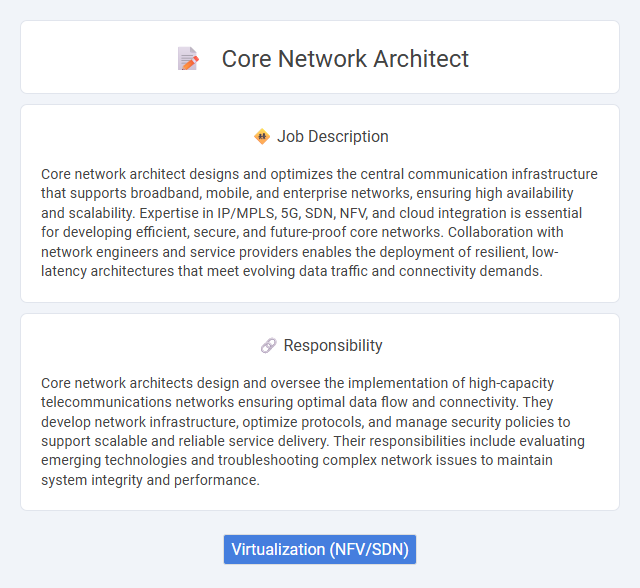
Core network architect designs and optimizes the central communication infrastructure that supports broadband, mobile, and enterprise networks, ensuring high availability and scalability. Expertise in IP/MPLS, 5G, SDN, NFV, and cloud integration is essential for developing efficient, secure, and future-proof core networks. Collaboration with network engineers and service providers enables the deployment of resilient, low-latency architectures that meet evolving data traffic and connectivity demands.
Individuals with strong analytical skills and a passion for network technology likely find a core network architect role suitable due to its demand for complex problem-solving and strategic planning. People who thrive in high-pressure environments and possess excellent communication abilities probably adapt well to coordinating with cross-functional teams and managing network infrastructure. Those uncomfortable with constant learning or detailed technical work may experience challenges in this position.
Qualification
A Core Network Architect must possess extensive experience in designing and optimizing telecommunications core networks, with deep knowledge of IP networking, MPLS, and 5G technologies. Proficiency in network protocols, cloud integration, and security standards is essential, alongside strong skills in network automation and orchestration tools such as SDN and NFV. Advanced certifications like Cisco CCIE, Juniper JNCIE, or equivalent are highly valued, complemented by a background in computer science, electrical engineering, or telecommunications.
Responsibility
Core network architects design and oversee the implementation of high-capacity telecommunications networks ensuring optimal data flow and connectivity. They develop network infrastructure, optimize protocols, and manage security policies to support scalable and reliable service delivery. Their responsibilities include evaluating emerging technologies and troubleshooting complex network issues to maintain system integrity and performance.
Benefit
Core network architect positions likely offer substantial benefits, including competitive salaries and comprehensive health insurance plans that promote employee well-being. Access to advanced technology and opportunities for professional growth may enhance job satisfaction and career development prospects. Flexible work arrangements and performance-based incentives might also improve work-life balance and motivate high performance.
Challenge
Core network architect roles likely involve complex challenges related to designing and maintaining scalable, secure, and high-performance network infrastructures. The probability of encountering rapidly evolving technologies and the need to integrate diverse systems could require continuous learning and adaptability. Managing network reliability and ensuring seamless connectivity while addressing potential cybersecurity threats might remain a critical and ongoing challenge.
Career Advancement
Core network architect roles demand expertise in designing and optimizing large-scale telecommunications infrastructure, leading to career advancement opportunities in senior network engineering and IT management positions. Mastery of 5G, MPLS, and SDN technologies enhances prospects for promotion to chief architect or network strategy director roles. Continuous certification in Cisco, Juniper, and cloud networking platforms accelerates progression toward executive-level responsibilities in network innovation and digital transformation.
Key Terms
Virtualization (NFV/SDN)
Core network architects specializing in virtualization design and implement Network Functions Virtualization (NFV) and Software-Defined Networking (SDN) solutions to optimize network performance and scalability. They develop virtualized core network infrastructures that enable dynamic resource allocation, automated network management, and improved service agility. Expertise in NFV orchestration, SDN controllers, and virtual network functions (VNFs) is critical for driving innovation in telecom and cloud-native environments.
 kuljobs.com
kuljobs.com